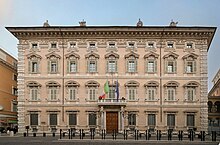Francesco Maria del Monte

Francesco Maria del Monte, full name Francesco Maria Bourbon del Monte Santa Maria, (5 July 1549 – 27 August 1627) was an
Career

Born in
He was created cardinal deacon in the
He served as Prefect of the
Academics such as Posner, Frommel, and Hibbard have drawn upon extant documents (principally the correspondence of Dirk van Ameyden) that suggest the strong likelihood that he was
He died in his Rome palace, the (
Patron of science and art

The epitaph on Del Monte's tomb describes him as an "excellent patron of the good arts".[7] Del Monte was a perceptive supporter of the arts and sciences – he was the first recorded owner of the Portland Vase, and his Palazzo Madama household was one of the most important intellectual salons in Rome. At his death his art collection contained more than six hundred paintings, and his support of the young Caravaggio has given provenance to several of that artist's early works.
Together with his brother, he helped
Del Monte was a patron of German painter Adam Elsheimer[8] and Andrea Sacchi.[7]
Selected art from his collection
-
Caravaggio, The Lute Player, oil on canvas, 94 × 119 cm, Hermitage Museum, Saint Petersburg[10]
-
Caravaggio, The Musicians, oil on canvas, 92 × 118.5 cm,The Metropolitan Museum of Art
-
Caravaggio, Saint Catherine of Alexandria, oil on canvas, 173 x 133 cm,Museo Thyssen-Bornemisza, Madrid
-
Caravaggio, Bacchus, oil on canvas, 85 × 95 cm,Uffizi Gallery, Florence
-
Caravaggio, The Fortune Teller, oil on canvas, 93 × 131 cm, Louvre, Paris
-
Caravaggio, The Cardsharps, oil on canvas, 94 × 131 cm, Kimbell Art Museum, Fort Worth
References
- OCLC 53276621.
- [self-published]
- ^ Clovis Whitfield "The Camerino of Cardinal del Monte" Paragone, LIX, n.77, 2008, pp. 3–38
- ^ Encyclopaedia of Gay, Lesbian, Bisexual, Transgender and Queer Culture: Archived 2 April 2015 at the Wayback Machine Patronage I: The Western World from Ancient Greece until 1900
- ISBN 978-0-06-433322-1
- ISBN 9780241954645.
- ^ S2CID 191619204.
- ^ JSTOR 1482611.
- ^ 'Galileo, Courtier: RRThe Practice of Science in the Culture of Absolutism', Mario Biagioli, University of Chicago Press, 1993.
- JSTOR 884128.

![Caravaggio, The Lute Player, oil on canvas, 94 × 119 cm, Hermitage Museum, Saint Petersburg[10]](http://upload.wikimedia.org/wikipedia/commons/thumb/6/6a/Michelangelo_Caravaggio_020.jpg/120px-Michelangelo_Caravaggio_020.jpg)




